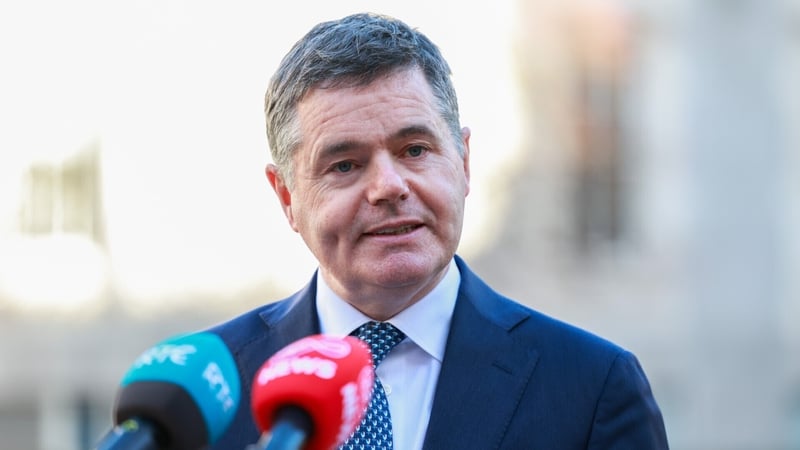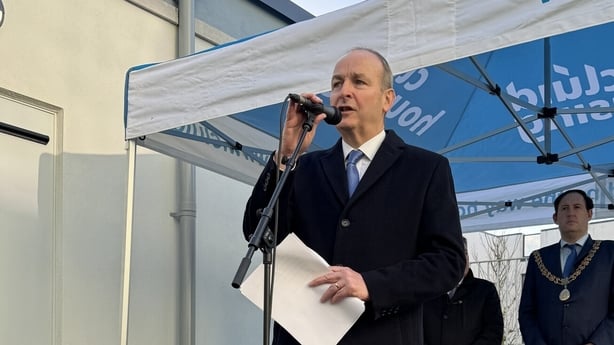
Minister for Public Expenditure Paschal Donohoe said a 'compromise' was reached on the new public sector pay deal
Minister for Public Expenditure Paschal Donohoe has said that "after lots of negotiation" and "a very difficult process for both sides of the table", a "compromise" was reached on a new public sector pay deal.
The new deal will provide for increases of 10.25% over a two-and-a-half year period.
Mr Donohoe said he was not going to go into the details, but said there was movement in lots of areas as well as "goodwill" from both Government and union representatives as a "compromise" was reached on the deal.
He outlined what persuaded him to make some final changes to reach this final agreemeent after talks that continued in the early hours of this morning at the Workplace Relations Commission (WRC).
He told RTÉ's Today with Claire Byrne: "There were two factors - I do believe that reaching agreement in relation to the value of public wages in the economy over a two and a half year period is really vital in how we can keep and retain and develop our public services and public servants.
"And secondly from a national finance point of view and the competitiveness of our economy this kind of wage growth and knowing where we stand across the next two and half years is really valuable to how we manage our economy and create an atmosphere of stability and certainty."
The last round of pay talks was adjourned without agreement in the early hours of 11 January.
The Government had offered pay increase of around 8.5% over two-and-a-half years but unions had sought increases worth around 12.5%.
Mr Donohoe acknowledged that there "was little point" in going back to the Workplace Relations Commission and asking unions to move on the original offer of 8% that was presented before Christmas if he wasn't willing to also do the same.
"I indicated that I did want to try and reach agreement," he added.

Tánaiste Mícheál Martin has welcomed the agreement on the deal
Minister Donohoe reaffirmed his commitment that the remaining small items of Financial Emergency (FEMPI) legislation will be "considerd and changed" during the year.
Financial Emergency (FEMPI) legislation was used to cut the pay of public servants as part of the austerity measures introduced following the financial crash of 2008.
"I gave that public commitment in December and I intend to honour that," he told the programme.
Within the new pay deal, he outlined the benefit of having a local bargaining clause.
He told the programme: "There is such a wide variety of public servants that each part of our public services have different issues they wish to prioritise.
"And what we have done in setting aside 1% of the overall agreement is creating flexibility inside the agreement to try and make progress on some of those matters."
He said 1% in terms of the value of our overall pay bill is over €300 million.
Mr Donohoe said even over two and a half years it is an awful lot of money and will be "used well."
Tánaiste Mícheál Martin welcomed the agreement on the deal.
He said he believed it would make a difference to people, particularly coupled with a number of anti-inflation and cost reduction measures already implemented by the Government.
He told RTÉ News: "It's been a very challenging time with the inflationary cycle that has emerged from the post-Covid period, the war in Ukraine and the consequential impact on energy prices which drove prices generally.
"This is a strong deal in terms of the scale of it and when you add it to the cost reduction measures that we took in the Budget, the cost of living package but also cost reductions in public services, the free primary school books and free school books up to Junior Cert, to reductions in the cost of health services, I think overall it will help to cushion people against what has been a very difficult period of price rises and inflation."
Sinn Féin's Louise O'Reilly said it appeared negotiators had done "a good job" but that the "devil is always in the detail".
She told RTÉ's Today with Claire Byrne that the consultation period was "very necessary" and members will want to know what it means for them individually.
Fianna Fáil TD Jim O’Callaghan told the same programme that it was a good deal and that now the Government must ensure the deal has advantages for workers but also serves the public service.
Additional reporting Paschal Sheehy

